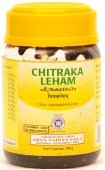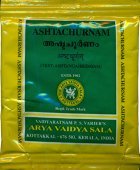Trikatu, Trikaṭu, Tri-katu: 16 definitions
Introduction:
Trikatu means something in Hinduism, Sanskrit, Marathi. If you want to know the exact meaning, history, etymology or English translation of this term then check out the descriptions on this page. Add your comment or reference to a book if you want to contribute to this summary article.
In Hinduism
Ayurveda (science of life)
Rasashastra (Alchemy and Herbo-Mineral preparations)
Source: archive.org: Rasa-Jala-Nidhi: Or Ocean of indian chemistry and alchemyTrikatu refers to a combination of the three pungents, viz., shunthi, pippali, and maricha. (see Bhudeb Mookerji and his Rasajalanidhi)
Veterinary Medicine (The study and treatment of Animals)
Source: Asian Agri-History: Paśu Āyurvēda (Veterinary Medicine) in GaruḍapurāṇaTrikaṭu (त्रिकटु) refers to a type of powder, and is used in the various Anupāna (“drink take”), according to sections on the treatment of Horses (Gajāyurveda or Aśvāyurveda) in the Garuḍapurāṇa.—The Anupāna i.e. the drink take along with or after medicine was important in treatment. Because it may help in carrying, absorption, assimilation and enhancing action of the drugs. Normally the selection of anupāna is done depends upon disease, doṣa etc.—[...] In diseases of the deranged kapha sarṣapa-taila (mustard oil) with vyoṣa/trikaṭu powders are used as anupāna.
Toxicology (Study and Treatment of poison)
Source: Shodhganga: Kasyapa Samhita—Text on Visha ChikitsaTrikaṭu (त्रिकटु) refers to an herbal ingredient which is included in a (snake) poison antidote recipe, according to the Kāśyapa Saṃhitā: an ancient Sanskrit text from the Pāñcarātra tradition dealing with both Tantra and Viṣacikitsā—an important topic from Āyurveda which deals with the study of Toxicology (Viṣavidyā or Sarpavidyā).—Kāśyapa prescribes various antidotes to quell the poison by administering them through nasal drugs, collyrium, ointment, herbal drinks and diet. According to Kāśyapasaṃhitā (verse VIII.12)—“Equal measures of powdered Vyūṣa or Trikaṭu, Asafoetida and garlic administered nasally by filling the same in the nose is also effective in combating poison.”.
Unclassified Ayurveda definitions
Source: Wisdom Library: Āyurveda and botanyTrikaṭu (त्रिकटु, “three spices”) is the Sanskrit name for a group of medicinal plants, eg:
- Pippalī (long pepper ),
- Marica (black pepper ),
- Śṛṅgavera or Śuṇṭhī (dried ginger).
They are classified as destroying fat and kapha, meha, curing abdominal glands, catarrh, dullness of the appetite and indigestion. It was originally composed by Suśruta in his Suśrutasaṃhitā sūtrasthāna XXXVIII, a classic work on Āyurveda. The name is derived from the words tri (‘three’) and kaṭu, translating to “pungent” or “spice”. The collection of herbs named Trikaṭu is but one of the thirty-seven gaṇas (‘sections’) of such groups.
According to the Mādhavacikitsā it also has medicinal properties used for the treatment of all major fevers (jvara), as described in the Jvaracikitsā (or “the treatment of fever”) chapter. In this work, it also bears the name Vyoṣa.
Source: Google Books: Essentials of AyurvedaTrikaṭu (त्रिकटु).—The Sanskrit name for an important Ayurvedic drug combination.—Trikaṭu, like Triphalā, is the combination of three pungents—Śuṇṭhī, Pippalī and Marica. It destroys vāta and kapha and promotes digestive fire.
Source: archive.org: Sushruta samhita, Volume IThe Trikatu group consists of
- Pippali,
- Maricha
- and Shringavera.
It destroys fat and Kapham, proves curative in cutaneous affections, leprosy (Kushtha), and morbid discharges from the urethra, and is possessed of the virtue of curing abdominal glands, catarrh, dullness of the appetite and indigestion.
Source: Ancient Science of Life: Snake bite treatment in Prayoga samuccayamTrikaṭu (त्रिकटु) refers to the “three pungents”, and is employed in the treatment of poison (viṣa), such as that resulting from maṇḍali (viperine snake-bites) and maṇḍaliviṣa, according to the 20th century Prayogasamuccaya (one of the most popular and widely practised book in toxicology in Malayalam).—The third chapter covers maṇḍali (viperine) snake treatment. [...] Vegānusāra-cikitsā (stage wise treatment), specific symptoms and treatment of 16 types of maṇḍali snakes are explained here. E.g.: In rakta-maṇḍali bite, bleeding from nose and mouth, foul smell, deep enmity, hatred, fainting etc. will be seen. When these are the symptoms, curd, trikaṭu (three pungents), saindhava (rock salt), butter, honey and Kuṣṭha (Saussurea lappa) should be mixed and used internally. Management of complications in maṇḍali viṣa also has been explained. Management of complications in maṇḍaliviṣa also has been explained. [...]
Source: gurumukhi.ru: Ayurveda glossary of termsTrikaṭu (त्रिकटु):—Four pungents; group of four parts of three plants which are punj+D461ent in taste viz. , Piper nigrum, Elettaria cardamomum, Cinnamomum zeylanicum, Cinnamomum tamala

Āyurveda (आयुर्वेद, ayurveda) is a branch of Indian science dealing with medicine, herbalism, taxology, anatomy, surgery, alchemy and related topics. Traditional practice of Āyurveda in ancient India dates back to at least the first millenium BC. Literature is commonly written in Sanskrit using various poetic metres.
Languages of India and abroad
Marathi-English dictionary
Source: DDSA: The Molesworth Marathi and English Dictionarytrikaṭu (त्रिकटु).—m S An aggregate of three spices, viz. dry ginger, black pepper, long pepper.
Marathi is an Indo-European language having over 70 million native speakers people in (predominantly) Maharashtra India. Marathi, like many other Indo-Aryan languages, evolved from early forms of Prakrit, which itself is a subset of Sanskrit, one of the most ancient languages of the world.
Sanskrit dictionary
Source: DDSA: The practical Sanskrit-English dictionaryTrikaṭu (त्रिकटु).—dry ginger, black pepper and long pepper taken together as a drug; शिरामोक्षं विधायास्य दद्यात् त्रिकटुकं गुडम् (śirāmokṣaṃ vidhāyāsya dadyāt trikaṭukaṃ guḍam) Śālihotra 62.
Trikaṭu is a Sanskrit compound consisting of the terms tri and kaṭu (कटु).
Source: Cologne Digital Sanskrit Dictionaries: Shabda-Sagara Sanskrit-English DictionaryTrikaṭu (त्रिकटु).—m.
(-ṭuḥ) The aggregate of three spices, viz. black and long pepper, and dry ginger. E. tri three, or three-fold, and kaṭu pungent, (as a spice.)
Source: Cologne Digital Sanskrit Dictionaries: Monier-Williams Sanskrit-English Dictionary1) Trikaṭu (त्रिकटु):—[=tri-kaṭu] [from tri] n. the 3 spices (black and long pepper and dry ginger), [Suśruta]
2) [v.s. ...] cf. kaṭu-traya.
Source: Cologne Digital Sanskrit Dictionaries: Yates Sanskrit-English DictionaryTrikaṭu (त्रिकटु):—[tri-kaṭu] (ṭuḥ) 2. m. The aggregate of three spices, black and long pepper and dry ginger.
[Sanskrit to German]
Sanskrit, also spelled संस्कृतम् (saṃskṛtam), is an ancient language of India commonly seen as the grandmother of the Indo-European language family (even English!). Closely allied with Prakrit and Pali, Sanskrit is more exhaustive in both grammar and terms and has the most extensive collection of literature in the world, greatly surpassing its sister-languages Greek and Latin.
Kannada-English dictionary
Source: Alar: Kannada-English corpusTrikaṭu (ತ್ರಿಕಟು):—[noun] (collectively) the three pungent, medicinal substances ginger, long pepper and pepper.
Kannada is a Dravidian language (as opposed to the Indo-European language family) mainly spoken in the southwestern region of India.
See also (Relevant definitions)
Starts with: Trikatucurna, Trikatuka, Trikatukadi, Trikatutaila, Trikatutriphaladi.
Full-text (+80): Trikatuka, Trikatraya, Tryushana, Trivarnaka, Vyosha, Shleshmaghni, Sarvakita, Kitavisha, Shleshmaghna, Krimivisha, Sarvakrimi, Krimyapaha, Kita, Krimi, Katukatraya, Kitapaha, Ativisa, Kshara, Trivarga, Trika.
Relevant text
Search found 15 books and stories containing Trikatu, Tri-katu, Tri-kaṭu, Trikaṭu; (plurals include: Trikatus, katus, kaṭus, Trikaṭus). You can also click to the full overview containing English textual excerpts. Below are direct links for the most relevant articles:
Rasa Jala Nidhi, vol 2: Minerals (uparasa) (by Bhudeb Mookerjee)
Part 5 - Use of essence of Makshika < [Chapter II - Uparasa (2): Makshika (pyrites)]
Part 6 - Use of incinerated mica < [Chapter I - Uparasa (1): Abhra or Abhraka (mica)]
Part 5 - Use of the essence of Bimala < [Chapter III - Uparasa (3): Bimala or Vimala (pyrites with red tints)]
Sushruta Samhita, Volume 6: Uttara-tantra (by Kaviraj Kunja Lal Bhishagratna)
Chapter XIX - Treatment of hurt or injnry to the eye < [Canto I - Shalakya-tantra (ears, eyes, nose, mouth and throat)]
Chapter LVI - Symptoms and Treatment of Cholera (Visuchika) < [Canto III - Kaya-chikitsa-tantra (internal medicine)]
Chapter XLI - Symptoms and Treatment of Phthisis (Shosha) < [Canto III - Kaya-chikitsa-tantra (internal medicine)]
Amarakoshodghatana of Kshirasvamin (study) (by A. Yamuna Devi)
Economics (3): Goods of trade < [Chapter 3 - Social Aspects]
Rasa Jala Nidhi, vol 1: Initiation, Mercury and Laboratory (by Bhudeb Mookerjee)
Part 4 - Mercurial operations (2): Boiling of Mercury (svedana) < [Chapter IV-V - Mercurial operations]
Part 18 - Mercurial operations (16): Incineration of mercury (bhasmikarana) < [Chapter IV-V - Mercurial operations]
Part 12 - Mercurial operations (10): Swallowing of metals of Mercury (grasana) < [Chapter IV-V - Mercurial operations]
Rasa Jala Nidhi, vol 4: Iatrochemistry (by Bhudeb Mookerjee)
Part 34 - Treatment for chronic diarrhea (6): Vahni-jvala rasa < [Chapter III - Jvaratisara fever with diarrhoea]
Part 19 - Treatment of Udara-roga (16): Mrityu-nirodha rasa < [Chapter VI - Diseases affecting the belly (udara-roga)]
Treatment for fever (73): Pratapa-lankeshvara rasa < [Chapter II - Fever (jvara)]
Rasa Jala Nidhi, vol 5: Treatment of various afflictions (by Bhudeb Mookerjee)
Related products
(+4 more products available)





